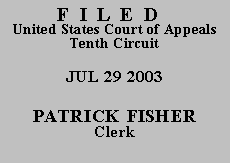

| JOE R. McBRIDE,
v.
JOHN DOE |
|
Plaintiff Joe R. McBride, who at the time of filing this appeal was an Oklahoma state prisoner, brought this action in federal court under a claim of diversity jurisdiction, 28 U.S.C. § 1332(a). He alleges that when he was between nine and eleven years old, he was sexually assaulted by a man named "Scott," who was his mentor in the Big Brother Big Sister Program ("the Program"). Defendants are the Program and "Scott," who is denominated in the caption as "John Doe." In his complaint, Plaintiff alleged that "Scott" had "moved out of state" but made no allegations regarding the citizenship, state of incorporation, or principal place of business of the Program.
The district court adopted the report and recommendation of the magistrate judge, and dismissed the action for want of subject matter jurisdiction, holding that Plaintiff "has failed to present sufficient factual allegations demonstrating diversity of citizenship" with regard to Defendant "Scott." Although the district court focused on the lack of jurisdictional allegations regarding "Scott," we affirm on the basis of a lack of jurisdictional allegations referring to the Program.
"The party seeking the exercise of jurisdiction in his favor 'must allege in his pleading the facts essential to show jurisdiction.'" Penteco Corp. v. Union Gas Sys., Inc., 929 F.2d 1519, 1521 (10th Cir. 1991), quoting McNutt v. General Motors Acceptance Corp., 298 U.S. 178, 189 (1936). When suing multiple defendants in a diversity action, the plaintiff bears the burden of proving that diversity jurisdiction exists for each defendant. United States ex. rel. General Rock & Sand Corp. v. Chuska Dev. Corp., 55 F.3d 1491, 1495 (10th Cir. 1995).
Plaintiff's filings, both before the district court and before this court, contain no information from which it can be determined whether diversity exists. Plaintiff fails to allege what type of entity the Program is or whether he is suing the local, regional, or national branch of the Program. More significantly, Plaintiff has not alleged the Program's citizenship, state of incorporation, or principal place of business, and thus fails to carry his burden of establishing diversity with regard to each of the named defendants.
Although we are mindful of our duty to construe the allegations of pro se litigants liberally, Plaintiff's filings lack even the most minimal assertions required to establish jurisdiction in federal court. We find that dismissal is warranted despite Plaintiff's pro se status. See Meyerson v. Harrah's East Chicago Casino, 299 F.3d 616, 617 (7th Cir. 2002) (dismissing pro se lawsuit for lack of subject matter jurisdiction when plaintiff failed to allege citizenship of defendants).
We therefore AFFIRM the district court's dismissal of the complaint. We DENY Plaintiff's motion to proceed without prepayment of the appellate filing fee. Plaintiff must make immediate payment of the unpaid balance due.
Entered for the Court
Michael W. McConnell
Circuit Judge
*.This order and judgment is not binding precedent, except under the doctrines of law of the case, res judicata, and collateral estoppel. The court generally disfavors the citation of orders and judgments; nevertheless, an order and judgment may be cited under the terms and conditions of 10th Cir. R. 36.3.